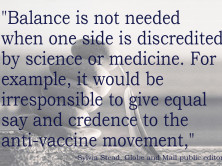(Credit: Canada's Mental Health Commission, screenshot)
Canada’s Mental Health Commission studied print and broadcast news reports and found that “media coverage of mental illness in Canada is overwhelmingly negative,” the Windsor Star reported. The commission identifies itself as a not-for-profit organization “to promote mental health in Canada, and work with stakeholders to change the attitudes of Canadians toward mental health problems, and to improve services and support.”
The study focused on “8,838 articles published between 2005 and 2010 that mentioned any of the terms “mental health,” “mental illness,” “schizophrenia” and “schizophrenic,'” according to the Windsor Star.
Researchers – including Rob Whitley – noted that “84 per cent did not quote a person with a mental illness, and 74 per cent did not quote an expert.” Whitley is quoted as saying that there is a “lot of lazy journalism” and noting that most articles studied didn’t include information on “resources and poor quality of care” or focus on “recovery (or) rehabilitation.”
Whitley added that many articles sensationalize reports on mental illness.
We asked the Mental Health Commission what other issues the commission found during its study and what its guidance is for reporting on mental health illness. The commission’s Opening Minds director Micheal Pietrus told iMediaEthics by e-mail that the commission’s study showed that “the media rarely interviewed people with a lived experience of mental illness or professionals in the field. The media did little to examine the lack of programs and funding.”
As for advice to journalists reporting on mental health issues, Pietrus wrote:
“The media should report accurately and be objective. It should seek information from experts and people with a lived experience. It should also dig deeper to find the root causes when incidents occur. People with a mental illness are far more likely to be a victim than a villain. Clarify whether the accused was undergoing treatment at the time of an alleged crime. That is an important factor. The media should also explore positive stories of recovery.”
The commission announced its findings in a Feb. 2 press release. According to the press release, the study found “almost 40% of news articles about mental illness focus on danger, violence and criminality and only 12% of articles take an optimistic tone.”
The commission also held a symposium for journalism students at Ryerson University. The symposium, “Mental Illness and Stigma in News Reporting” was held March 15, 2011, according to a press release. Another symposium was held Feb. 2, 2012. Micheal Peitrus, the Mental Health Commission of Canada’s Opening Minds director, told iMediaEthics that “There have been five symposia held at journalism schools across Canada and a sixth is planned for later this month at the University of British Columbia.”
The commission also plans to publish the study’s “preliminary results” at a June 4-6 conference ” Together Against Stigma: Changing how we see mental illness.” According to Peitrus, the commission’s study is “ongoing,” and while it “is scheduled to wrap-up at the end of 2012,” it “will likely be extended for several more years.” When the study is completed, the results will be “published in full.”
According to the conference website, it is the “5th International Stigma Conference.” This conference is typically hosted by the World Psychiatric Association “every two years,” according to Pietrus, who noted that the association and the commission are “partnering…for this conference.”






